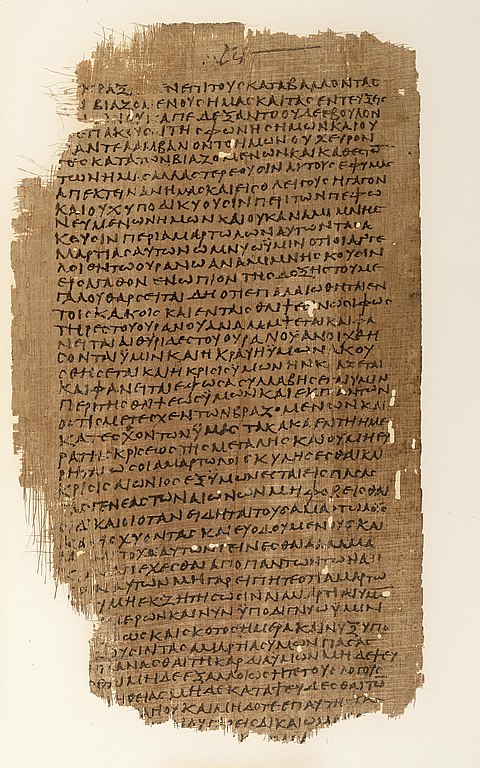Book of Enoch
The Book of Enoch (also 1 Enoch; Hebrew: סֵפֶר חֲנוֹךְ, Sēfer Ḥănōḵ) is an ancient Hebrew apocalyptic religious text, ascribed by tradition to Enoch, the great-grandfather of Noah. Enoch contains unique material on the origins of demons and Nephilim, telling why some angels fell from heaven, an explanation of why the Genesis flood was morally necessary, and prophetic exposition of the thousand-year reign of the Messiah.
Three books are traditionally attributed to Enoch, including the distinct works 2 Enoch and 3 Enoch, although none of the three books are considered canonical scripture by the majority of Jewish or Christian bodies.
The older sections I Enoch (mainly in the Book of the Watchers) of the text are estimated to date from about 300–200 BC, and the latest part (Book of Parables) probably to 100 BC.
Content
The Book of Enoch is divided into five sections with distinct subject matter. Most scholars believe that these five sections were originally independent works (with different dates of composition), themselves a product of much editorial arrangement, and were only later redacted into what is now called 1 Enoch.
- The Book of the Watchers (1 Enoch 1–36)
- The Book of Parables of Enoch (1 Enoch 37–71) (also called the Similitudes of Enoch)
- The Astronomical Book (1 Enoch 72–82) (also called the Book of the Heavenly Luminaries or Book of Luminaries)
- The Book of Dream Visions (1 Enoch 83–90) (also called the Book of Dreams)
- The Epistle of Enoch (1 Enoch 91–108)
Canon status of text
Various Aramaic fragments found in the Dead Sea Scrolls, as well as Koine Greek and Latin fragments, are proof that the Book of Enoch was known by Jews and early Near Eastern Christians. This book was also quoted by some 1st and 2nd century authors as in the Testaments of the Twelve Patriarchs. Authors of the New Testament were also familiar with some content of the story. A short section of 1 Enoch (1:9) is cited in the New Testament Epistle of Jude, Jude 1:14–15, and is attributed there to "Enoch the Seventh from Adam" (1 Enoch 60:8), although this section of 1 Enoch is a midrash on Deuteronomy 33:2. Several copies of the earlier sections of 1 Enoch were preserved among the Dead Sea Scrolls.
It is not part of the biblical canon used by Jews, apart from Beta Israel (Ethiopian Jews). While the Ethiopian Orthodox Tewahedo Church and Eritrean Orthodox Tewahedo Church consider the Book of Enoch as canonical, other Christian groups regard it as non-canonical or non-inspired, but may accept it as having some historical or theological interest.
It is today wholly extant only in the Ethiopian Ge'ez language. For this and other reasons, the traditional Ethiopian belief is that the original language of the work was Ge'ez, whereas modern scholars argue that it was first written in either Aramaic or Hebrew, the languages first used for Jewish texts.
Influences
The Book of Enoch plays an important role in the history of Jewish mysticism: the scholar Gershom Scholem wrote, "The main subjects of the later Merkabah mysticism already occupy a central position in the older esoteric literature, best represented by the Book of Enoch." Particular attention is paid to the detailed description of the throne of God included in chapter 14 of 1 Enoch.
It has had a tremendous influence on occult literature, especially grimoires dealing with ritual magic. Many Medieval books about demons and angels pull their inspiration from the Book of Enoch or from other texts which were influenced by it. John Dee's Enochian magic is named for Enoch and his magical texts could be considered a successor to the Book of Enoch.
Angels and demons in the Book of Enoch
Some of the fallen angels that are given in 1 Enoch have other names, such as Rameel ('morning of God'), who becomes Azazel, and is also called Gadriel ('wall of God') in Chapter 68. Another example is that Araqiel ('Earth of God') becomes Aretstikapha ('world of distortion') in Chapter 68.
Azaz, as in Azazel, means strength, so the name Azazel can refer to 'strength of God'. But the sense in which it is used most probably means 'impudent' (showing strength towards), which results in 'arrogant to God'. This is also a key point in modern thought that Azazel is Satan. Also important in this identification is the fact that the original name Rameel, is very similar in meaning to the word Lucifer ('Morning Star') which is a common Latin name of Satan in Christianity.
Nathaniel Schmidt states "the names of the angels apparently refer to their condition and functions before the fall," and lists the likely meanings of the angels' names in the Book of Enoch, noting that "the great majority of them are Aramaic."
The name suffix -el means 'God' (see list of names referring to El), and is used in the names of high-ranking angels. The archangels' names all include -el, such as Archangel Uriel ('flame of God') and Archangel Michael ('who is like God').
Gadreel (Hebrew: גדר האל, romanized: Gader ha-el, lit. 'Wall of God') is listed as one of the chiefs of the fallen Watchers. He is said to have been responsible for deceiving Eve. Schmidt lists the name as meaning 'the helper of God.'
The Book of Parables of Enoch contains mentions of archangel Metatron, which many Kabbalists believe is the angelic form of Enoch.
